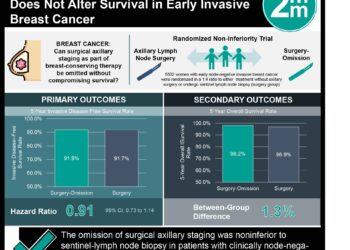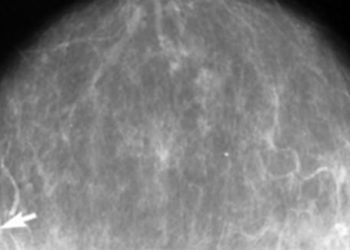The KATHERINE trial: trastuzumab emtansine more effective than trastuzumab alone for treating residual HER2-positive breast cancer
1. Patients with residual human epidermal growth factor receptor 2 (HER2)-positive breast cancer after chemotherapy and HER2 targeted therapy had higher disease-free survival if treated with trastuzumab emtansine as opposed to trastuzumab alone.
2. More adverse events and serious adverse events occurred in patients treated with trastuzumab emtansine.
Evidence Rating Level: 1 (Excellent)
Study Rundown: Among patients with HER2-positive breast cancer, patients with residual invasive disease at surgery after chemotherapy and HER2-targeted treatment often have poor clinical outcomes. Currently, patients with residual disease often undergo HER2-target therapy, though combination of HER2-target therapy plus another agent may provide superior clinical outcomes. The KATHERAINE trial sought to evaluate invasive disease-free survival of patients with residual HER2-positive breast cancer when treated with combination trastuzumab emtansine versus trastuzumab alone. Results indicated significantly improved survival in the combination therapy group. Distant recurrence rates were also significantly lower in the combination therapy group.
This study suggests greater survival outcomes are possible even after patients with residual disease have received HER2-targeted therapy, though its limitation in patients with residual disease were not tested to confirm persistent HER2-positive status.
Click to read the study in NEJM
Relevant Reading: Trastuzumab emtansine for HER2-positive advanced breast cancer
In-Depth [randomized controlled trial]: This multicenter, phase 3, randomized controlled trial enrolled patients between 2013 and 2015. Eligible patients had histologically confirmed HER2-positive invasive breast cancer and residual disease after treatment with chemotherapy and trastuzumab for a prespecified period of time. Patients were randomized in a 1:1 fashion to trastuzumab (n=743) of trastuzumab emtansine (n=743) groups after surgery with stratification for clinical stage and hormone receptor status at presentation. Treatment out to 14 cycles with combination or trastuzumab therapy was performed. The primary outcome was invasive disease-free survival, which includes freedom from death, distant recurrence, or various local sites of breast cancer recurrence. Clinical assessment of disease recurrence occurred every 3 months until year 2, then every 6 months until year 5, then every year until year 10. Invasive disease-free survival was greater in the combination therapy group compared to those treated with trastuzumab (hazard ratio [HR], 0.50; 95%CI, 0.39 to 0.64; P<0.001). Patients estimated to be disease-free at 3 years post-randomization was 88.3% in the combination group and 77.0% in the trastuzumab group. Risk of distant metastasis was lower in the combination therapy group (HR, 0.60; 95% CI, 0.45 to 0.79). With subgroup analysis, all subgroups were shown to have superior or indeterminant invasive disease-free survival outcomes when treated with trastuzumab emtansine. There was no significant difference observed in overall survival outcomes between groups. Patients completed all 14 cycles of therapy in 71.4% and 81.0% of combination and trastuzumab therapy, respectively. Serious adverse events (grade 3 or higher) occurred in 25.7% and 15.4% of combination and trastuzumab therapy patients, respectively.
Image: PD
©2019 2 Minute Medicine, Inc. All rights reserved. No works may be reproduced without expressed written consent from 2 Minute Medicine, Inc. Inquire about licensing here. No article should be construed as medical advice and is not intended as such by the authors or by 2 Minute Medicine, Inc







